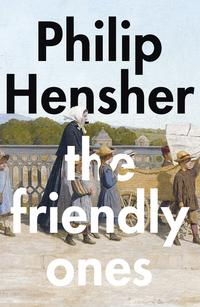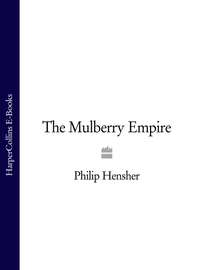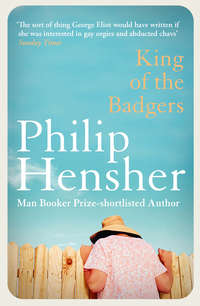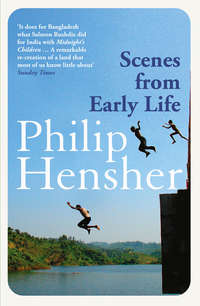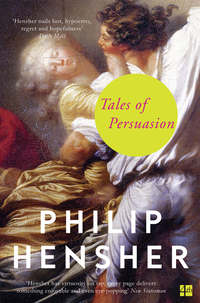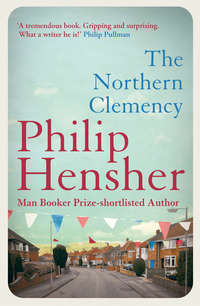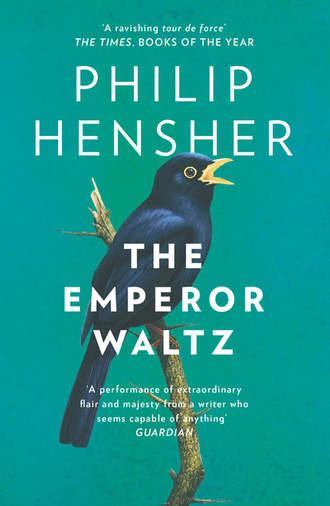
Полная версия
The Emperor Waltz
For weeks now, his father had been constructing a false sugar cube with a shock inside it. First, he had carved a dreadful-looking beetle with goggling eyes and cruel buck teeth out of balsa wood – not even a centimetre long, but you could see its cruelty and ugliness. Then he had stained it black, leaving it to dry under a piece of newspaper, in case Felix’s mother should stumble in. Then he had dipped it in sugar solution, again and again, and finally coated it with table sugar until it closely resembled a sugar cube. Felix had watched all the procedure. His father had not explained what he had been doing. He had merely let Felix watch the preparations and manufacture of the beetle and its encasement in sugar, as if it were a natural part of existence, which Felix would understand if he watched the process. What the purpose of the beetle in the cube was, Klee would not need to explain. It was a practical joke, and therefore not in need of any explanation.
They were sitting side by side, Klee taking occasional puffs and Felix trying not to fix his attention too much on the sugar cube, when Lily wheezed up the stairs. The cat, hearing her, roused itself; stretched and yawned, arched its back, and went to the door of the studio just as Lily opened it. It curled itself about her boots as she walked in; it largely ignored or put up with Klee and Felix’s embraces and gestures of love, but Lily, who only ever gave it a gruff, impatient shake about the head and neck, the cat adored Lily. ‘Am I late?’ she said, dropping her coat on the sofa and coming over to the tea table. ‘It was so lovely a day I felt I had to go a little further than usual. Not cold?’ She felt the tea urn. ‘Good, good. I saw Itten and his children in the park. Gracious heavens, they look so very extraordinary, and their painting, I know, must be simply awful. And I thought I saw Feininger at a distance, queuing with a lot of other Feininger-like beings, but it turned out to be a grove of trees. When is Frau Gropius coming, Paul – do you remember? Ah, tea! “In this world there’s nothing finer/than the tea that comes from China.”’
‘This tea comes from India, however,’ Klee said. As long as Felix could remember, his mother had always poured her cup of tea with the words of what he thought might be an advertising slogan from her childhood; just as long, his father had responded, drily, with the information that this tea, however, came from India. He did not trust himself to speak; he was not looking, with agonizing force of will, at the sugar bowl.
‘Itten saw me, but made no attempt to greet me,’ Lily said. ‘Gracious heavens, he should be ashamed of himself, dressing in such a way, like …’ She paused, contemplating what Itten and his disciples might resemble, and as she thought, she lifted the lid of the sugar bowl and took what must be the false sugar cube, dropping it into her tea from between her fat thumb and forefinger. Felix had thought, with agony, that she might take the wrong one, and delay the catastrophe until tomorrow or even the day after that. But she had taken the sugar cube today. ‘. . . like Mazdaznan, is all you can say,’ she went on. ‘If a child of mine were in Itten’s care, all I can say is—’ And then she shrieked, gratifyingly. The black beetle had floated to the top of her tea and was rotating gently in the English cup. ‘Ah, Paul, you will be the death of me.’
Klee said nothing, but his eyes were full of amusement. Felix was gulping back his laughter. His father was devoted to practical jokes, but exercised them with rigour: he never, as far as Felix knew, played a trick on anyone outside the family, and he only ever played tricks that he could make and invent himself. Only once, in Felix’s memory, had he resorted to a purchased trick; it had been a small rubber bubble that was placed beneath a tablecloth before inflating itself and moving like a mysterious animal about the dinner things. Felix and his mother had adored it, but Klee had shaken his head, half smiling, as if deprecating his own enjoyment in something that anyone could purchase. Since then, there had been carved wooden fruit in the fruit bowl and small amounts of gunpowder buried halfway down one of his mother’s cigarettes, but no more purchased tricks.
‘The beetle!’ Lily said. ‘The beetle!’
Klee slightly smiled. Felix could see his hand under the table had yielded to one of its habits: it was running up and down a musical scale. He knew what this meant: his father wanted to return to work. When music came into appearance – some sound of humming, the gestures of a hand running up and down a piano keyboard or a violin – it did not mean that Klee was about to start practising on the violin, which sat in the corner of the studio on a shelf. It more usually meant that he was thinking of his painting, and wanting to return to it. Presently Klee finished his tea, poured another cup and finished that, quickly, too; Lily finished her story about seeing a woman who looked really very much like Frau Gropius outside the Elephant Hotel, but who had turned out to be someone quite different; Felix slid off the chair, with its uncomfortable oil-slippery seating; and they left Klee to his work.
‘Do you have the black beetle, Mamma?’ Felix said, as they went down the stairs together.
Lily felt in the pocket of her skirt. ‘No – how awful. Now the thing will only turn up somewhere else and make me scream all over again. Do you have mathematics homework? Do you want to work in the kitchen, or in your bedroom?’
But Felix had the black beetle; he had asked knowing where it was; it was for him, now, to decide where it should turn up, and whom it should make scream. Outside, in the quiet street, the lamplighter was beginning to make his patient rounds, still wearing his white summer overall.
7.
The next day, Christian had decided to go out soon after breakfast, and to find the school building at least. He had always had a desire to place himself within cities; not to spend more time than necessary wandering without a notion, and not to put up with living in a city in a state of ignorance about its quarters. He slept well – once, in the night, he woke up and was unsure where he was until he heard an owl calling in the park, and what must be the creak of a roof adjusting as the night cooled. He had never slept anywhere other than with a family above, and a family below; he had never slept in a room with a sloping wall, like this one, underneath a long roof of tiles, and he looked forward to being woken in the night by the rattle of rain or hail. The pillow was warm, and he raised his head and turned it to the cool side. There was a faint smell of fresh laundry about the sheets, the smell that linen had after being dried in the open air. He felt, as he drowsily moved his hands from one side of the tight-wrapped bed to the other, that there was something restless about being in the same house and sharing the same sleep as people he had never met before yesterday, whose Christian names he did not know, who were not related to him or to each other in any way. They were brought together by force and by money, he sleepily said to himself, force and money, Neddermeyer and Scherbatsky, Scherbatsky and Neddermeyer, and the third one, whose name was … whose name was … But Herr Wolff’s name did not come to him in the night; it came to him only with a satisfying abruptness when he was washing his face and torso at the washbasin in the morning. Wolff. He wondered if he had returned from Erfurt last night after they had all gone to bed.
‘I shall not be in for lunch, Frau Scherbatsky,’ Christian said, when he had finished breakfast.
‘If only,’ Frau Scherbatsky said. ‘If only all my guests were so considerate!’
Neddermeyer, reading the Morgenblatt, lowered it and shook his head sympathetically.
‘I’m sure he has important business in Erfurt,’ Frau Scherbatsky said. ‘Still, Maria grows very testy at the uncertainty.’
‘Cook a nice rabbit stew,’ Neddermeyer said. ‘And keep everyone happy, however many you find yourself entertaining.’
Frau Scherbatsky clapped her hands. ‘What an excellent idea! My mother – you know, Herr Vogt, I am quite a country lass – my mother always said that she would prefer a well-made rabbit stew to any fricassee or ragout. My father was always very pleased at shooting a brace because rabbits are a dreadful pest in the wrong place, which of course rabbits always are, in the wrong place, I mean. Yes, a rabbit stew it shall be, tonight, with some very nice little turnips from the garden.’
Christian left the house after breakfast, and walked along the road, still a rough lane, that led along the side of the park. He felt, in his loose jacket and short tie, like a man who belonged in this famous town. The houses here, like Frau Scherbatsky’s, were substantial and artistically made. Outside one, with a steep-pitched red roof and a yellow door, a pair of green-painted benches were placed in the lane for the rest of the weary traveller, or so the painted motto from Goethe stated on the wall. Another had a flat roof, of southern inspiration, and others had friezes of angels and devils painted along the walls, under the roofs. There was a pleasant smell of coffee being made from one of the houses, and the sound of eggs being fried; the clatter of knives came out of the open window of one kitchen. ‘“Alfred, Alfred, you’ll be the death of me,”’ the song of last year, burst out; a scullery-maid came out of one kitchen door singing; she threw her bowlful of eggshells, peelings and muddy vegetable water over the compost heap, scattering the half-dozen white chickens who were picking over it with squawks and flappings. Dashingly, Christian reached up and plucked a pear from a tree overhanging the lane; he put it into his pocket for later. At the end of the lane, the main road out of Weimar into the country, he waited as a lumbering famer’s cart went by, as heavy and groaning as if made of lead, and after it, the watering cart of the district, pulled by two huge and shaggy horses. The farmer raised his fat fingertips lightly to the brim of his broad and grubby straw hat; Christian, smiling, nodded.
It was still early when Christian reached the central square of the town, and the Saturday market was still presenting an orderly and fresh appearance. Although he had just finished Frau Scherbatsky’s breakfast, he took the pear from his pocket and ate it as he went round the market. He had thought that the art school was on the other side of the square, but quickly found himself in a quiet residential street. He turned back and tried another side of the square; this time he found himself facing a statue that proved to be of Goethe and Schiller and, behind that, a grand pillared theatre. A gaggle of white geese, intelligent and imperious, was making its way through the square in the direction of the market, driven by a freckled boy of fifteen or so; a man at the wheel of a black car, his vehicle shiny and bright in the sun, waited for them to pass. Christian sat down on the steps of the Goethe statue to feel in his pocket for the small map he had cut out of the guide to the city; it was not there. He remembered now taking it out of his bag, and placing it on the dressing-table ready to take out, but not taking it out.
A shabby figure was in front of him. ‘Do you know what you are sitting upon?’ he said, in a brusque, military manner.
‘I think so,’ Christian said. He observed the man: he was wearing a cheap blue suit made out of some dyed military material. It fitted him so badly that, when the man made a strong chopping gesture with his arm, a lecturer’s decisive gesture, it appeared to move a second or so behind the man, as if it had its own stiff ideas of movement to follow. ‘Goethe and Schiller.’
The man made an impatient movement, flinging his arm to one side and tipping his head back to look down his nose at Christian, sitting on the stone steps of the monument. ‘Great poets and thinkers,’ he said.
‘Yes,’ Christian said. ‘Can you help me? Could you tell me where the Bauhaus is?’
‘The –’ the man said ‘– the— What did you call it?’
‘The Bauhaus,’ Christian said. He had an irrational feeling that this stranger was, in fact, Frau Scherbatsky’s other lodger, the unreliable Herr Wolff. The man stood in front of him with his legs apart, building up to some sort of rage. He was wearing what seemed to be military medals, although he did not seem dressed in other ways for a funeral or other ceremony.
‘He means the art school,’ a woman who had been taking an interest now butted in to say.
‘Yes,’ the man said. ‘It used to be a respectable art school, but now it calls itself the Bauhaus. So you’re one of those, are you? No wonder you sit on the steps of Germany’s monuments, insulting its greatness. Communists and garlic-eaters and free-love practitioners! Go off to Moscow or Paris, why don’t you?’
Among the small crowd that was now gathering to enjoy the abuse, there was a girl who was grinning broadly. She was at the front of the gathering. Her clothes were simple and rustic, perhaps home-made; they were dark green, straight up and straight down, with a gathering at the neck of blue ribbon, simply tied. Her hat, impatiently shoved on her head, was a coal scuttle made out of brown felt. Her grin was empty and her mouth was too large for her small head. With some shock, Christian saw that her head under the hat must be shaved; he saw the stubble above her ear. The smile and the cock of the head towards him was of indefinable familiarity; it was the smile of a friend not yet recognized. It’s me, the smile said. Come on, it’s only me.
‘Yes, we know what they get up to over there,’ the man went on. ‘Four bare legs in a bed. Klimt. Anarchy. We don’t want that in the city of Goethe and Schiller. “This tree’s leaf, that from the east—”’
‘Oh, do shut up,’ the girl said, calling loudly as soon as the man started to throw his arm out and quote Goethe at them. Her voice was hoarse but educated, with some Bavarian musicality to it.
‘Don’t tell me to shut up,’ the man said. ‘Who told me to shut up?’
‘I did,’ the girl said, still grinning, and raising her hand like a schoolchild. ‘Don’t talk rubbish about what you don’t know. Do you want to know where the Bauhaus is?’
Christian did not realize for a moment that she was speaking to him.
‘Hello! You wanted to know where the Bauhaus was. Come with me.’
‘In this city …’ the man began, unconvincingly, but he had missed his moment, and as the girl took Christian by the wrist and led him roughly off, the little group of onlookers dispersed. On the ground, a drunk man lay on one side, clawing at the air with his left hand and cycling at nothing with his legs, like an upturned cow waiting to be righted.
8.
‘Why are you looking for the Bauhaus?’ the girl said fiercely, as they walked away from the Goethe-statue square.
‘I’m starting there on Monday,’ Christian said. ‘They sent me directions but I left them behind, at my lodgings.’
‘But what I can’t understand, what I can’t understand at all, not one bit,’ the girl said, as if they had been having a conversation for days, for weeks, which had not reached a conclusion, ‘is why someone who doesn’t look like a complete idiot and buffoon and twit, not really, anyway, why someone quite normal should want to go and find the Bauhaus on a Saturday when he doesn’t have to go there until the Monday. That I don’t know if I can understand.’
‘You only have to push me in the right direction,’ Christian said.
‘Because when you get to the Bauhaus for the first time,’ the girl said, ‘oho, oho, that is when it all goes wrong. You hear about lines and essences and energy in a point and the hidden cross-weave and the drain a colour can make in the middle of a form. And how yellow can be yellow or it can be a completely different thing. Look at that yellow.’
The girl grabbed Christian’s arm with both hands, and forcibly made him point at the yellow wall of a palace. He felt they must be conspicuous, but the people of Weimar were apparently used to gestures of this sort. ‘That is what you call yellow,’ she said. ‘Isn’t it?’
‘It is a yellow,’ Christian said, being specific in the way he had heard an art master once attempt.
‘And there,’ the girl said, pulling him round and making him point again, at a different palace, this time in a deep rustic red, ‘that, too, that is what you would call A YELLOW, is it not.’
‘No, that’s red!’ Christian said, forgetting to be specific.
‘Ah,’ the girl said. ‘You see, that is just a matter of context. That yellow only looks red because it lies between two contrasting greens, and the greens have their counter energy, which they project onto the underlying yellow, and there it is, red but only perceived as red. Not real red. You see?’
The wall was still, undeniably, red. The girl, a head shorter than him, came up close to his face. She smelt, curiously, not unattractively, of fresh sweat and of garlic. He remembered what his landlady had said about the diet of the Bauhaus students.
‘And that is the sort of thing which the Bauhaus will draw you into, and make you believe, and make you accost strangers and explain, and turn you into a raving madman before it turns you into an artist. But let us go on. Look, beauties to the right, beauties to the left. An important library built by a duchess for her thirty-four children straight ahead of us, and directly behind – don’t turn – an elephant house in the Gothic Revival style, 1674, three stars in your guidebook. What is your name?’
‘Christian Vogt. I come from Berlin.’
‘I did not ask all that. I come from Breitenberg. My name is Elsa Winteregger. What sort of maker are you?’
‘What sort of—’
‘What do you make? If you are coming to the Bauhaus, then what is it that you make?’
And now they were standing in a shady square, irregular in shape, with a poster pillar at its centre. The weathervane on top of the poster pillar swung indecisively from left to directly away from them and back again. Christian remembered his decisive belief.
‘I am a painter,’ he said. It was the first time he had said it in front of anyone at all. Elsa Winteregger was the person he had chosen to hear his decision.
‘Oh, yes,’ she said. She thought for a moment; looked him up and looked him down; she placed her hands on her hips. ‘And when did you arrive in Weimar?’
‘Yesterday afternoon,’ he said.
‘And you come out without your book, your paper, your charcoal and your pencils to draw the beautiful city of Weimar?’
Christian crimsoned. Of course that was the first thing he should have done. It had not occurred to him. Of course a real artist would have loved to take the opportunity to go outside with pencil and paper to sketch a new, a beautiful and interesting city. Christian’s sketchbook was still in his suitcase. He had done nothing, and it had not occurred to him among the most urgent possibilities, last night or this morning. The question of whether he was an artist at all, whether he was deluding himself, presented itself painfully.
‘Or you might be the sort of painter who never goes outside with his easel,’ the word pronounced sarcastically, ‘and his paintbrushes, and his oil paints to paint. You might stay inside the studio painting canvases of something that is almost-but-not-quite a black square superimposed on a red triangle. Don’t you think red is the most important journey you can take as a painter? Who is the greatest painter?’
‘I think the Spaniard Picasso,’ Christian said, priding himself on producing so up-to-date a name.
‘No, it is El Greco,’ Elsa said, ‘or if we are talking about the living, there is no one more wonderful, wonderful, wonderful, than Malevich. Have you discovered what he has to say about black?’
Christian shook his head. He felt defeated before he had even started. Elsa flung her face to the sky, and shouted, in the quiet Weimar square, ‘“As the tortoise draws its limbs into its shell at need, so the artist reserves his scientific principles when working intuitively.”’
A window was flung open, and a voice responded. ‘“But would it be better for the tortoise to have no legs?”’
‘Who is that?’ Elsa shouted angrily. ‘Who is that?’
‘It’s me,’ the voice came. A head poked out of the window; neat-groomed, en brosse, a nice snub nose. His shoulders were bare. ‘I heard someone quoting Itten, I thought I would finish it off.’
‘I wasn’t quoting Itten,’ Elsa said. ‘I was quoting Malevich.’
‘You were quoting Itten, you idiot, you just don’t know it,’ the man at the window said. ‘Who is your friend?’
Christian said, ‘My name is Christian Vogt.’
‘This is not my friend,’ Elsa said again. ‘It is a boy I found in the street. He was being harangued by a local mob. I discovered that he was trying to find the Bauhaus. The Bauhaus, the Bauhaus, the Bauhaus …’ Elsa’s voice trailed off into song; she lowered her shoulders and, apelike, swung her arms to and fro in an enchanted manner. Her eyes slid back into her skull.
‘I see,’ the man said. ‘Goodbye, Elsa. Goodbye, whatever your name might be, I didn’t hear.’
‘Christian Vogt,’ Christian said, but the window was already closed. ‘Goodbye, then,’ he said to the girl in the brown cloche hat, her eyes shut as she crooned. He felt quite put out, as if a friend who had been walking with him had turned aside for someone more interesting. But Elsa was only standing, alone in the square, singing ‘The Bauhaus, the Bauhaus, the Bauhaus,’ to herself in half-tones, with a wide open smile of pure uninterruptible joy. Christian was a hundred paces away before he knew he should have said, ‘Kandinsky,’ to Elsa’s question.
9.
Fritz Lohse withdrew his head from the outside and back into the room. It was a pleasant room, painted pale green, with a dressing-table, an upright old leather armchair, a Turkey rug on the floor and an awkward-shaped, almost square old rustic bed painted yellow. There were twenty sheets of paper, drawn-on, pinned to the walls above the bed and to the ceiling, so that Fritz could see his best ideas immediately on waking. On the dressing-table, by the oil lamp, there sat the remains of last night’s supper: some black bread and two soup pots, alongside the bones of two small game birds. There was an octagonal table, in size between a card table and a dining table; its undecidable size had perhaps led Frau Mauthner, the owner of the building and Fritz’s landlady, to expel it upstairs to her lodger’s room with all the other furniture. On the table there were five objects, just as there had been for the past three weeks.
Fritz observed, with admiration, the ripe curves of his girl Katharina. She was all pink and white above the rumpled bedding; she lay face down. Her back was a deep hollow, rising to her magnificent wide bottom, her thighs slightly marked with the quiver and dimple that fat under skin makes. He imagined striding across the room and taking a deep bite, a spoonful of a bite, out of her thighs. How she would shriek! Katharina was a shrieker, as well as a snorer at night, and, in times of unoccupation, a singer; it was a real trial to her to keep silent during their nights for the sake of Frau Mauthner She was still lying in the bed, hugging a bolster to her as she liked to. She was face down upon it; it ran from her chin between her breasts, under her belly and between her legs; it pushed her rump upwards and emerged between her knees. Fritz often wondered why she did not hug him at nights, but she said she preferred something long, cold, hairless and squashy. She was not asleep; she was just enjoying the bed, and the pleasure of lying there naked in the morning, far too late.
‘What was all that rumpus?’ Katharina said softly, into the mattress. But Fritz was used to the sort of things that Katharina said.
‘It was only Elsa Winteregger,’ Fritz said. ‘She was making a spectacle of herself, as usual. She was giving out Mazdaznan proverbs.’
‘Which one? The one you told me about breathing steadily and praising the Lord?’


